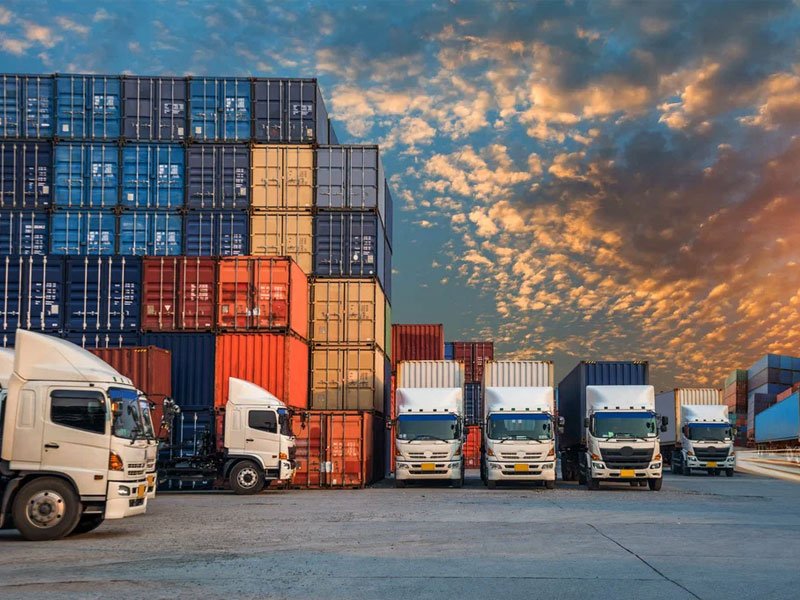
Logistic
Ground
Freight
Our ground freight solutions cater for all types of cargo: whether it’s just a few pallets, or an oversized shipment that requires road closures. We provide full truck load (FTL) in a truck reserved for you for moving large loads quickly, less than truck load (LTL) with shared trucks for saving on freight expenses, transportation of refrigerated, hazardous or oversized cargo.
We can manage the door-to-door movement of your goods – including all paperwork – giving you complete peace of mind concerning the safe and punctual arrival of your cargo.
We provide services mainly from/to EU, CIS countries and all neighboring countries.
By truck, train or river barge, we move your goods efficiently and to any location required
Our Experience Your Advantage
Services:
- FTL door-to-door services with Turkish, Bulgarian and Iranian trucks.
- LTL service of palletize or non-stackable cargoes.
- Over-sized and out of gage cargoes with bogie and required escorts.
- Refrigerated trucks and small vehicles for foods products and medicine transport.
+8
Countries
+90
Companies
Get The Best Freight
01
Enter Your Contact Details
02
Enter the Shipment Details
03
Our Team Will Contact You Shortly
Get A Free Quote
Enter The Details Below For Our Team So That We Can Reach Out To You For A Free Quote.
In the intricate tapestry of global commerce, where the movement of goods represents the lifeblood of economies, the term “freight” evokes visions of products embarking on journeys that span continents. At the core of this vast and interconnected web, ground freight emerges as a silent workhorse, tirelessly contributing to the seamless functioning of the logistics ecosystem. Despite often residing in the shadows of its faster and larger counterparts—air freight and maritime transport—ground freight is a linchpin that quietly weaves together the threads of supply chains, playing a pivotal role in ensuring that goods reach their intended destinations.
Ground freight’s significance lies in its ability to navigate the local and regional intricacies of transportation, offering a reliable and cost-effective solution for the movement of goods within specific geographic areas. While air freight dazzles with its speed and ocean freight impresses with its capacity for large-scale cargo, ground freight excels in connecting businesses, manufacturers, and consumers on a more intimate scale. It is the unassuming force that supports industries ranging from retail and manufacturing to healthcare and agriculture, serving as the backbone of overland logistics.
In this exploration, we venture into the world of ground freight, uncovering its key attributes that make it indispensable in the global supply chain. We delve into the challenges it faces, such as traffic congestion and regulatory complexities, which shape its operational landscape. Moreover, we illuminate the innovations that are reshaping ground freight, from sustainable practices and technological advancements to the evolving role of ground transportation in the age of e-commerce. Ground freight, though often overshadowed, emerges as a fundamental component in the dynamic and ever-evolving narrative of international trade and commerce.
Understanding Ground Freight
Ground freight encompasses the movement of goods over land, utilizing a variety of vehicles such as trucks, trains, and vans. This mode of transportation is particularly well-suited for shipments that do not require the speed of air transport but benefit from the flexibility and cost-effectiveness of overland travel. Ground freight is the linchpin of local and regional logistics, providing a reliable means to transport goods across cities, states, and even entire continents. From the delivery of consumer goods to the transportation of raw materials, ground freight weaves together the threads of the supply chain, ensuring that products reach their destination efficiently.
Efficiency, Cost-Effectiveness, and Environmental Considerations
One of the primary advantages of ground freight lies in its efficiency and cost-effectiveness. Ground transportation networks are well-established, allowing for smooth and predictable transit times. With the ability to carry a diverse range of cargo, from small parcels to oversized machinery, ground freight offers versatility that caters to the diverse needs of industries.
Moreover, as sustainability becomes an increasingly critical factor in logistics decisions, ground freight is positioned as a more environmentally friendly option compared to certain modes of transport. Companies are embracing innovations such as electric and hybrid vehicles, alternative fuels, and route optimization technologies to reduce the carbon footprint of ground freight operations. The focus on eco-friendly practices aligns with broader global initiatives to create a more sustainable and responsible logistics industry.

Challenges and Innovations in Ground Freight
While ground freight boasts efficiency, it is not without its challenges. Traffic congestion, road infrastructure limitations, and regulatory hurdles can impact delivery timelines and increase operational costs. However, the industry is actively addressing these challenges through technological innovations. Advanced tracking systems, real-time data analytics, and the integration of artificial intelligence are enhancing visibility and efficiency in ground freight operations. Additionally, the rise of autonomous vehicles and smart logistics solutions holds the promise of transforming the landscape of ground freight, making it even more streamlined and responsive to evolving market demands.
Ground Freight in E-Commerce
In the era of e-commerce dominance, the significance of ground freight is accentuated during the crucial last mile of delivery. Ground transportation is the final link connecting distribution centers to homes and businesses, influencing customer satisfaction and loyalty. The speed and reliability of ground freight services contribute directly to the success of e-commerce operations, shaping the consumer experience in the age of instant gratification.
Pros and Cons of Ground Freight
Ground freight, a cornerstone of overland logistics, provides a versatile and reliable means of transporting goods. However, like any mode of transportation, it comes with its own set of advantages and challenges. In this exploration of the pros and cons of ground freight, we delve into the factors that make it an indispensable component of the supply chain while acknowledging the hurdles that logistics professionals often grapple with.
Pros of Ground Freight
- Cost-Effective and Efficient:
Ground freight is renowned for its cost-effectiveness, especially for shipments that do not require the speed of air transport. With well-established transportation networks and predictable transit times, ground freight offers an efficient solution for moving goods over short and medium distances. This cost-efficiency becomes particularly advantageous for businesses managing tight logistics budgets.
- Versatility in Cargo Handling:
Ground freight accommodates a wide range of cargo sizes and types. From small parcels to oversized machinery, trucks and other ground vehicles can transport diverse loads. This versatility makes ground freight suitable for industries with varying shipment requirements, contributing to its widespread adoption in local and regional logistics operations.
- Sustainability Initiatives:
In response to environmental concerns, the ground freight industry is increasingly adopting sustainability initiatives. Logistics companies are incorporating electric and hybrid vehicles into their fleets, exploring alternative fuels, and leveraging route optimization technologies to reduce their carbon footprint. These eco-friendly practices align with the broader global push toward sustainable logistics solutions.
- Last Mile Connectivity:
Ground freight plays a crucial role in the last mile of delivery, connecting distribution centers to homes and businesses. This aspect is particularly significant in the context of e-commerce, where the speed and reliability of ground freight services directly influence customer satisfaction. Ground transportation becomes the final link in ensuring that products reach their destination promptly and intact.

Cons of Ground Freight
- Traffic Congestion and Delays:
One of the primary challenges faced by ground freight is the unpredictability of road conditions. Traffic congestion, especially in urban areas, can lead to delays in delivery schedules. These delays can impact the overall efficiency of the supply chain and result in increased operational costs for logistics companies.
- Limited Distance Coverage:
While ground freight is excellent for local and regional transportation, it may face limitations when it comes to long-distance or international shipments. The time required for overland travel may make it less suitable for industries that prioritize speed over cost, such as those dealing with perishable or time-sensitive goods.
- Weather-Dependent:
Ground transportation is susceptible to weather conditions, especially adverse ones. Snowstorms, heavy rainfall, or extreme heat can disrupt road travel, leading to delays and potential damage to goods. This weather-dependency poses a challenge for logistics professionals who must navigate through diverse and unpredictable climates.
- Regulatory Challenges:
Navigating through different jurisdictions and complying with varying regulations poses another challenge for ground freight. Regulatory hurdles related to permits, customs procedures, and weight restrictions can complicate the logistics process, requiring careful planning and coordination to ensure smooth operations.
Ground Freight Cost and Rates
Ground freight costs are a critical factor in the logistics equation, influencing the decisions of businesses that rely on overland transportation to move their goods. The calculation of ground freight rates is a multifaceted process that takes into account various factors, each contributing to the final cost of shipping. These factors include the distance traveled, the weight and dimensions of the cargo, fuel prices, handling fees, and any additional services required during transit. Freight companies typically use a combination of these elements to determine the cost of ground freight, ensuring that the rates reflect the complexities of each shipment. The chargeable weight, which considers either the actual weight or the volumetric weight (whichever is higher), serves as a key metric in determining the pricing structure. As businesses seek to optimize their logistics budgets, understanding the intricacies of ground freight costs is crucial for making informed decisions that balance economic efficiency with reliable transportation services.
Navigating the financial landscape of ground freight rates requires a strategic approach by both logistics providers and businesses alike. To enhance cost-effectiveness, shippers often explore methods such as consolidating shipments, optimizing packaging to reduce volumetric weight, and leveraging technology for route optimization. Ground freight companies, in turn, seek operational efficiencies, investing in fuel-efficient vehicles and adopting innovative technologies to streamline their processes. Moreover, the transparency and accuracy of ground freight rates contribute to building trust between logistics providers and their clients, facilitating a collaborative partnership in which both parties can navigate the challenges of the supply chain while maintaining a clear understanding of the associated costs. As the logistics industry continues to evolve, the management of ground freight costs and rates remains a dynamic aspect of the broader effort to create efficient, reliable, and financially sustainable transportation solutions.
Ground Freight From / To Iran
Ground freight is one of the most reliable and cost-effective methods of transportation for cargo entering or leaving Iran. With its strategic location connecting Central Asia, the Middle East, and Europe, Iran plays a key role in international road logistics and trade routes such as the International North-South Transport Corridor (INSTC).
Ground Freight from Iran
Iran exports a wide range of products including petrochemicals, construction materials, food products, carpets, and agricultural goods. Ground freight is a preferred mode of transport to neighboring countries like Iraq, Turkey, Afghanistan, Armenia, Azerbaijan, Turkmenistan, and Pakistan.
Key advantages:
Cost-effective for regional trade
Direct road access to border countries
Fast customs clearance at main land borders
Flexible truck options (FTL – Full Truck Load, LTL – Less than Truck Load)
Ground Freight to Iran
Imports to Iran often include industrial machinery, electronics, raw materials, medical equipment, and consumer goods. Countries such as Turkey, China (via Pakistan), the UAE (via land-sea-land routes), and European nations frequently send goods by road to Iran.
Common entry routes:
Bazargan border (Turkey)
Dogharoun border (Afghanistan)
Mirjaveh border (Pakistan)
Astara border (Azerbaijan)
Why Choose Ground Freight for Iran?
Regional connectivity: Ideal for Middle Eastern and Central Asian logistics.
Customs handling: Easier at designated land border points.
Reliable for heavy and bulk cargo.
Cost-effective for medium distances compared to air freight.
Customs & Documentation
Efficient ground freight requires proper documentation:
Commercial invoice
Packing list
Certificate of origin
Transit permit (if required)
Vehicle and driver documents (CMR, carnet TIR, etc.)
Professional freight forwarders can simplify and accelerate customs procedures for both exports and imports.
Lian Visman Ground Freight Solutions
Ground freight to and from Iran is a vital component of the country’s regional and international trade, especially with neighboring countries such as Turkey, Iraq, Afghanistan, Pakistan, Armenia, and Azerbaijan. This mode of transport is particularly cost-effective for bulk cargo and goods that don’t require urgent delivery. Iran’s road network is well-developed, and its border crossings—such as Bazargan (Turkey), Mirjaveh (Pakistan), and Dogharoun (Afghanistan)—facilitate a steady flow of goods. Many exporters and importers rely on ground transport for agricultural products, construction materials, machinery, and consumer goods due to its affordability and flexibility in routing.
Freight companies like Lian Visman offer comprehensive ground freight services from and to Iran, including full truckload (FTL), less-than-truckload (LTL), customs clearance, and door-to-door delivery. With the ability to combine road with rail or sea routes when needed, ground freight ensures seamless logistics across Iran’s borders. This makes it a reliable choice for businesses operating within the Middle East, CIS region, and parts of Europe that are connected via overland trade routes.
Conclusion
As we navigate the complexities of the modern supply chain, ground freight stands resilient and indispensable. Its ability to offer cost-effective, reliable, and increasingly sustainable logistics solutions positions ground freight as a key player in the evolving world of global commerce. Whether it’s the rumble of a delivery truck on city streets or the hum of a freight train traversing vast landscapes, ground freight quietly continues to pave the way for economic connectivity, proving that sometimes, the most crucial journeys are the ones that happen right at ground level.

FAQs
Ground freight refers to the transportation of goods over land, utilizing trucks, vans, or trains. Unlike air or sea freight, ground freight is particularly well-suited for local and regional shipments. It is characterized by its cost-effectiveness and efficiency for transporting goods over shorter distances within a specific geographic area.
Ground freight rates are calculated based on several factors, including the distance traveled, the weight and dimensions of the cargo, fuel prices, handling fees, and any additional services required during transit. The chargeable weight, which considers either the actual weight or volumetric weight (whichever is higher), plays a key role in determining the cost of ground freight. Factors such as regulatory compliance, customs procedures, and any specific requirements for handling or special services may also contribute to the overall shipping cost.
Ground freight is suitable for a wide range of goods, from small parcels to large, bulky items. It is particularly advantageous for local and regional shipments where the efficiency of overland transportation is prioritized over speed. Ground freight is cost-effective, offers versatile cargo handling capabilities, and is well-suited for industries that do not require the rapid transit times associated with air freight.
The transit time for ground freight varies depending on the distance traveled, the specific route, and any potential delays such as traffic congestion or adverse weather conditions. While ground freight may take longer than air freight, it is known for its predictability and reliability within the context of local and regional transportation.
In response to environmental concerns, the ground freight industry is increasingly adopting sustainability initiatives. This includes the integration of electric and hybrid vehicles into fleets, exploring alternative fuels, and implementing route optimization technologies to reduce carbon emissions. Ground freight’s focus on sustainability aligns with broader efforts to create more eco-friendly and responsible logistics solutions.



Hello! I have a shipment that I need to transport by land to Iran. It’s currently in Turkey. Can you assist me with the logistics?
Dear Jackson,
Good day,
We provide service from Turkey.
Please send the shipment details to info@lianvisman.com we will quote the rate at the soonest .
Thank you for sharing with us, I believe this website genuinely stands out : D.